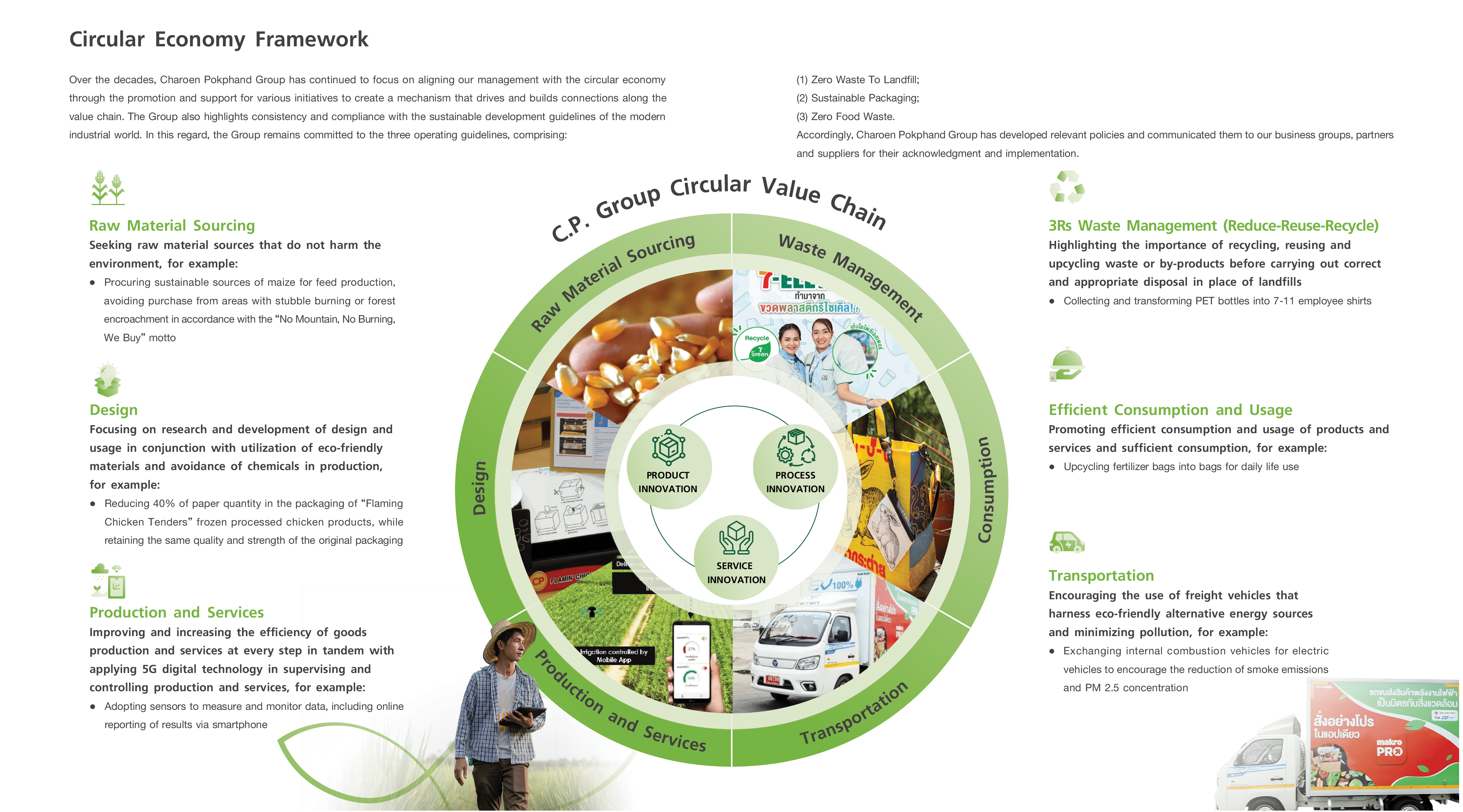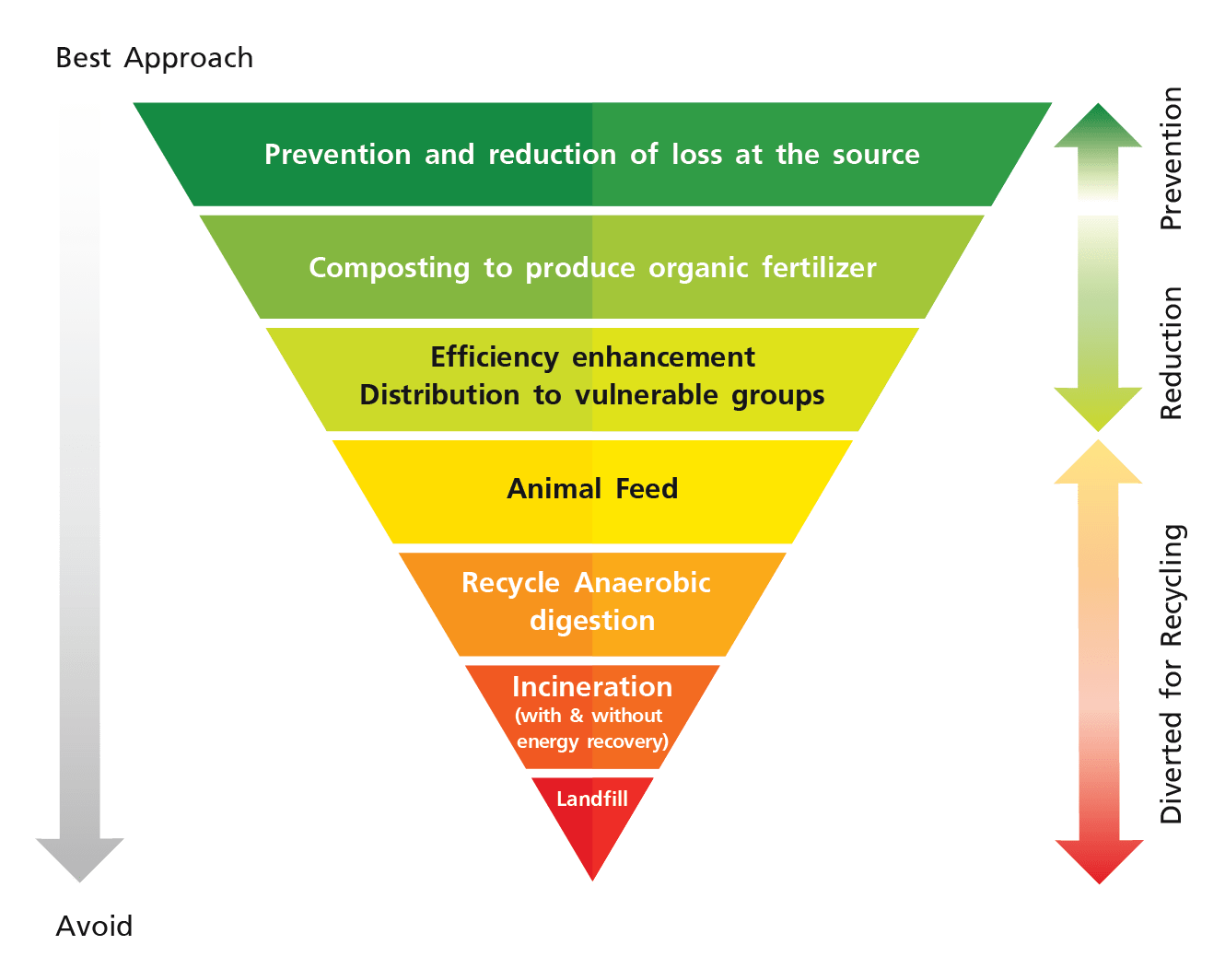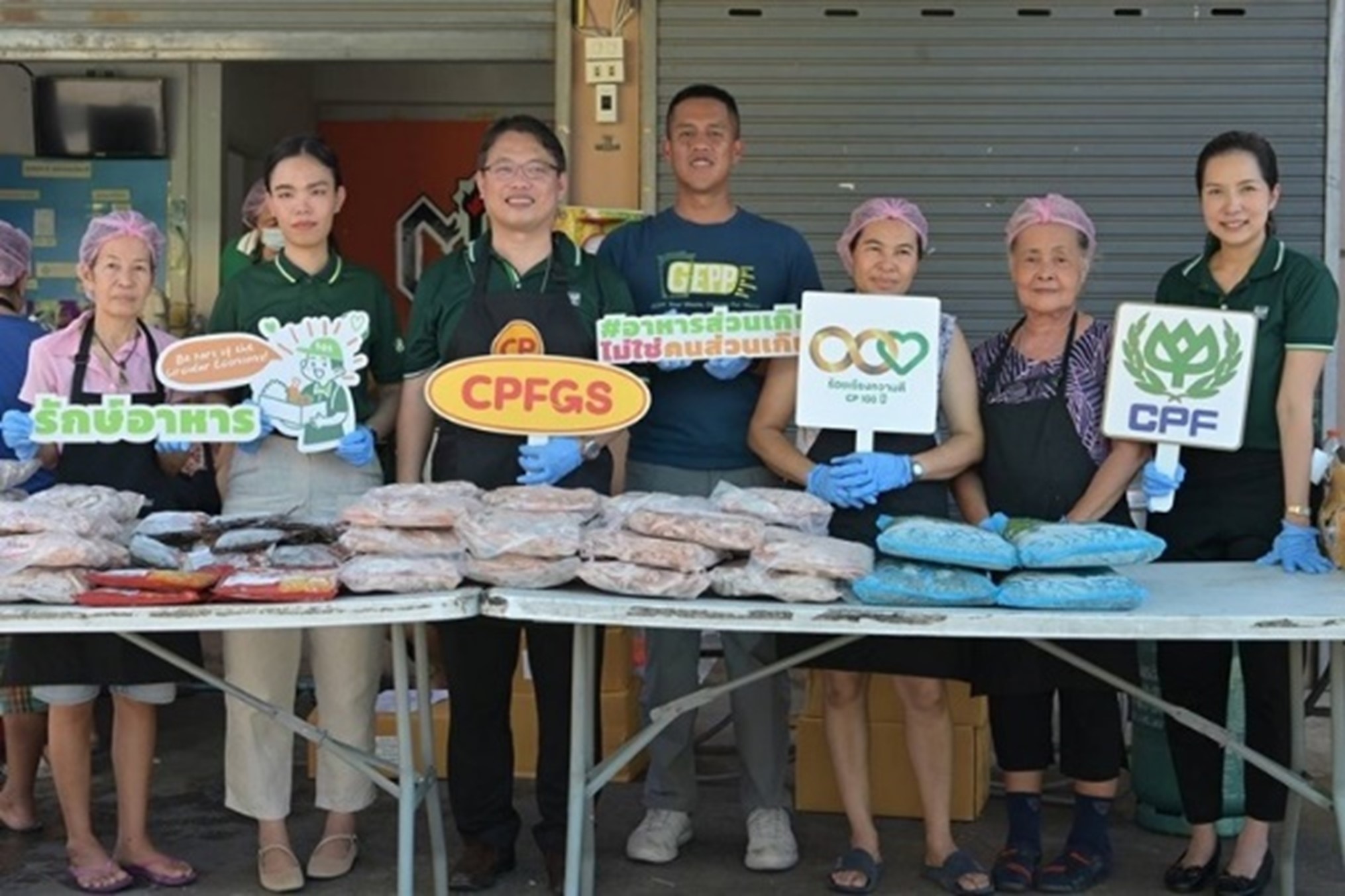Circular Economy
Goal and Performance
Our objectives for the circular economy at Charoen Pokphand Group are to achieve zero food waste, zero food loss, and to promote recyclable plastic packaging. We are committed to applying cutting-edge tactics throughout our supply chain to reduce food loss and waste and make sure that priceless resources are used effectively and sustainably. In addition, we're dedicated to creating and utilizing recyclable plastic packaging materials, minimizing single-use plastics, and supporting closed-loop systems that keep plastic in use and out of landfills and the oceans in order to promote a cleaner and greener environment. These objectives are consistent with our overarching vision, which is to develop an ethical and generative business model that promotes environmental stewardship and a circular economy.
Zero Food Waste to Landfill
Zero Waste to Landfill
All plastic packaging are recyclable, reusable or compostable
Supporting the SDGs
Charoen Pokphand Group's commitment to achieving zero food waste, zero food loss, and to promoting recyclable plastic packaging supports the achievement of three Sustainable Development Goals
More Details on Sustainable Development Goals Report 2023

Stakeholders Directly Impacted
Charoen Pokphand Group performs stakeholder assessment and prioritization process on an annual basis to evaluate impacts we have on them and how can they influence our strategies and actions over time. In 2023, the evaluation results showed that our commitment to reducing waste creates impacts on seven stakeholder groups
More Details on Stakeholder Engagement Report 2023
Circular Economy Management Approach
Charoen Pokphand Group, where sustainability and innovation converge to pave the way for a Better Tomorrow, understands that traditional linear models of production and consumption are not sustainable in the long run. That's why we have embraced the circular economy management approach as the core philosophy driving our operations. Our commitment to this revolutionary concept ensures that we minimize waste, maximize resource efficiency, and create a positive impact on the environment and society.
Traditional linear modes of production and consumption are not long-term viable, according to Charoen Pokphand Group, where sustainability and innovation intersect to pave the road for a Better Tomorrow. We have adopted the circular economy management strategy as the central tenet guiding our operations because of this. Our dedication to this ground-breaking idea guarantees that we reduce waste, increase resource efficiency, and have a good influence on society and the environment.
Moreover, we have a circular economy policy commitment, which stands as a testament to our dedication to sustainability and responsible business practices. Our policy encompasses a holistic and integrated approach to drive circularity across all aspects of our operations. We have set ambitious targets to achieve a significant reduction in our waste generation, increase the percentage of recycled materials used in our products, and promote the circular design of our offerings.
Through rigorous research and collaboration with industry experts and environmental organizations, we have developed a comprehensive roadmap that outlines our circular economy objectives and the measures we will take to accomplish them. Our policy emphasizes the importance of fostering a circular mindset within our organization and among our partners, suppliers, and customers.
Transition to Circular Economy
Assessment of Risks & Opportunities to Transition to Circular Economy
The circular economy journey of Charoen Pokphand Group is propelled by a deep comprehension of the challenges and opportunities it offers. Embracing the principles of "9Rs” we are determined to transition to a circular economy management approach that will reshape the way we do business. We understand the difficulties that lay ahead while excitedly grabbing the numerous opportunities that are available to us in our effort.

Plastic Management
The Charoen Pokphand Group is aware of the serious environmental issues that plastic waste and its effects on our ecosystems present. Our thorough strategy underlines our commitment to building a more sustainable future, and we are dedicated to setting the standard for plastic management. Reducing, recycling, and innovating are the three main pillars of our plastic management strategy. Reducing the usage of single-use plastics throughout our business and supply chain is our top priority. In addition to supporting eco-friendly packaging and pressuring our suppliers to use sustainable materials, we actively look for alternatives to single-use plastics.
A crucial part of our plastic management approach is recycling. We make an effort to properly process and recycle as much of the plastic trash produced within our facilities as possible to keep it out of landfills and away from the environment. In order to assist effective recycling activities, we also actively cooperate with industry partners and waste management companies.
Innovation is what motivates our attempts to handle plastic. We make investments in R&D to investigate cutting-edge technologies that allow us to develop recyclable and biodegradable substitutes for traditional plastics. By adopting cutting-edge approaches, we hope to reduce plastic pollution and open the door to a circular economy where plastics are utilized sustainably and ethically.
Sustainable Plastic Packaging Management
Charoen Pokphand Group recognizes the urgency of the plastic waste pollution crisis and the need to significantly reduce the production and consumption of plastic, including single-use plastic packaging, both domestically and overseas.
The Group has demonstrated our determination to operate with responsibility for product life cycle and environmental impacts. Additionally, the Group is committed to reducing plastic packaging and aims to establish an action plan to eliminate single-use plastic packaging. The Group further attaches importance to a sustainable distribution system and communicates to the public about the benefits of reducing, reusing and transforming single-use plastic as well as its costs.
1. Transparent and Verifiable
The Group annually discloses information on the quantity and type of plastic used, reused, recycled, reduced and disposed of in the Group’s Sustainability Report. We also require the verification of the disclosed information by an independent third-party auditor.
2. Plastic Reduction Policy and Transition Plan
The Group has implemented the “Sustainable Packaging” Policy since 2018 to determine the direction and framework for plastic management throughout the value chain by requiring all business groups around the world to set a common goal for 2025 to ensure that 100% of plastic packaging are “reusable, recyclable and compostable”.
3. Reduce, Avoid, Eliminate Single-use Plastic
The Group has expressed our commitment to eliminate the use of plastic and chemicals that cause problems to the health and environment, including non-recyclable plastic. We have also been exploring other alternative and natural materials that can replace single-use plastic.
4. Invest in Reuse Systems and New Product Distribution Systems
The Group encourages investment in R&D of product distribution innovations that are socially and environmentally responsible with no single-use plastic and emphasizes on reutilization. The Group has supported and provided technical cooperation to the Thailand National Metal and Materials Technology Center (MTEC) to enhance the development of food packaging innovation that is safe for consumers.
5. Extended Producer Responsibility
The Group supports and promotes the EPR (Extended Producer Responsibility) principle to extend the producer’s scope of responsibility and expand the network of responsibility for managing and recycling post-consumer packaging waste. Our business groups have collaborated with the Thai Institute of Packaging and Recycling Management for Sustainable Environment (TIPMSE) under the Federation of Thai Industries (FTI) through the PackBack Network, which collects and reintroduces packaging into a sustainable processing system. Furthermore, we also promote separation and collection of plastic packaging for recycling through the hypermarket business.
6. Promoting Product Life Cycle
The Group places importance on the source of materials, production, transportation and distribution through to the end of the product life cycle (LCA: Life Cycle Assessment) to assess potentials and identify opportunities of improvement which requires cooperation with plastic resin producers (upstream), converter manufacturers (midstream) and end-users (downstream) to sustainably manage a product’s life cycle.
7. Cooperation with Relevant Sectors
The Group has supported and cooperated with all sectors to define packaging design standards that enable reutilization and eliminate the use of plastic packaging that causes environmental impact.
8. Raising Customer and Public Awareness
The Group recognizes the importance to promote and support awareness raising efforts to engage customers and the public in solving the problem of single-use plastic packaging by reducing, avoiding and eliminating its use, as well as opting for alternative materials and transforming plastic for various forms of reutilization.
9. Plastic Scrap and Microplastic
The Group places importance on tackling the problem of plastic waste throughout the supply chain by collecting data on plastic scrap quantity while sorting and transforming the plastic scraps. We have also worked to enable microplastic detection in the production process in order to prevent plastic contamination in water, air and soil.
10. Supporting Waste Reduction Policies and Regulations
The Group has a policy to not support and eliminate the use of plastic packaging and single-use plastic. At the same time, we encourage relevant stakeholders to reduce, avoid and eliminate plastic packaging in accordance with the government’s policy on plastic waste management. We have also campaigned to reduce, collect and store plastic to prevent widespread pollution from plastic waste.
Plastic Management Progress
Sustainable Packaging Trend
Waste Management
Charoen Pokphand Group’s waste management policy commitment centers around reducing waste generation, maximizing resource efficiency, and adopting responsible disposal practices. The business promotes a culture of mindful consumption among stakeholders by turning waste into useful resources using the concepts of the circular economy. To encourage optimal practices and support the development of recycling infrastructure, transparency, and stakeholder participation are given top priority.
The handling of hazardous chemicals and substances at C.P. Group places a high priority on protecting human health, the environment, and following the law. The business implements the strictest safety regulations, does risk analyses, and effectively communicates hazards. To reduce dependency on hazardous substances, emphasis is put on the use of safer substitutes, continued research, and employee training. Chemical waste management practices that are appropriate for storage, transportation, and disposal are guaranteed.
C.P. Group remains dedicated to a sustainable future, where waste and hazardous substances are managed responsibly, not only as a legal obligation but also as a moral imperative. The company's commitment to transparency and continuous improvement underpins its mission to protect the environment, communities, and future generations from the potential impacts of waste and hazardous chemicals.
Further to the above commitments, the Group is also working toward protecting human health and the environment, which is why we have taken a bold stance not to develop new chemicals or products with Substances of Very High Concern (SVHC) properties. By refraining from the development of new chemicals or products containing SVHC properties, we aim to prevent potential harm and contribute to a safer and healthier world. This policy applies across all our business units and supply chain partners, reinforcing our dedication to compliance with global chemical regulations and standards.
Waste Management Progress
- Target and progress for waste and hazardous waste disposal
Total Quantity of Waste
(thousand tons)
Total Waste Sent to Landfill
(thousand tons)
Total Waste By Disposal Methods
Non-hazardous Waste
thousand tons
Hazardous Waste
thousand tons
Promoting Sustainable Waste Management
Sludge Management Using Sludge Digestion System to Generate Electricity

CPF Food and Beverage Company Limited has studied and developed a prototype of a system to digest sludge from the 120 m day wastewater treatment system and uses a sludge digester to generate electricity. The system utilizes sludge as raw material for fuel gas production. This is in line with the circular economy guidelines, which focus on reducing waste disposal through landfill methods and lowering greenhouse gas emissions. Under the objectives of this project, the Company also plans to develop a learning center on the management of sludge from wastewater treatment systems for interested factories in the future.
Wastes Management Training

Charoen Pokphand Group and the Circular Economy: To achieve the goals of zero food waste, zero food loss, and promoting recyclable plastic packaging, we are committed to employing advanced strategies throughout the supply chain. These strategies aim to reduce food loss and waste, ensuring that valuable resources are used efficiently and sustainably. All employees within the Group are provided with the following knowledge:
The Group's environmental policies, especially those related to the circular economy and sustainable packaging. Waste management guidelines, along with relevant waste-related laws and regulations. Sustainable packaging management practices, and relevant waste-related laws and regulations. The application of technology and innovation to reduce waste in accordance with the 9R principles. Collaboration with external entities in research and development within the circular economy framework. Case studies of successful initiatives both within and outside the Group.
Management Plan for Discarded or Abandoned Fish Gear
The Charoen Pokphand Group is aware of the dangers that abandoned or discarded fishing gear poses to the environment. However, we do not have any operation that involve with the use of fish gear, but we constantly build awareness to communities regarding the problem of discarded or abandoned fish gear.
Food Loss and Food Waste Management
The first line of defense against food loss and waste at C.P. Group is prevention. To guarantee the freshness and quality of our products, our operations and supply chain are supervised by strict food management procedures, which include the right handling, storage, and transportation. We work together with farmers, suppliers, and partners to put ethical production methods into place, encouraging optimum crop output and effective resource usage.
We aggressively engage in food recovery activities in addition to prevention to remove surplus or unsold food from our operations and supply chain. We redistribute eatable food to people in need by collaborating with neighborhood food banks, charities, and community organizations, thereby battling hunger and lowering food waste.
Our Policy Commitment's primary principles are openness and data-driven decision-making. We routinely monitor and evaluate the amount of food waste generated across all of our activities, setting aggressive reduction goals and tracking our results. We hope to encourage industry-wide cooperation and develop a team effort in the battle against food waste by sharing our research and experience.
Food Loss and Food Waste Management Progress
Food Loss and Food Waste
34 %
Food Waste
66 %
Food Loss
Total Food Waste and Volume of Food Loss that Sent to Landfill
(thousand tons)











